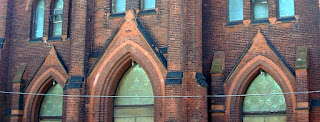


Shortly thereafter is when things got interesting, to say the least. St. John's had been established by German immigrants and conducted services in German. However by the early 1900's the younger members wanted English language services. Reverend William Von Gerichten did not speak English. A schism soon developed.
The "Boxers" felt that since the pastor didn't speak English he should be paid less. The others disagreed. A meeting was scheduled to discuss the problem. The pastor's group barricaded the doors to keep the Boxers out. The police were called and during the excitement that followed the Boxers climbed in through a window, held the meeting, and voted to dismiss the pastor.
The pastor and his supporters built a new church at 70 Military, corner of Glor, not all that far away from their original house of worship. Architect W. S. Brickell designed the new Immanuel German Evangelical Church which was built in 1904. Four years later Von Gerichten died, and by 1915 English services were introduced.



Today the church building is maintained by the Theosophical Society. Although I had thought it sounded like a new age group, its origins can be traced back to 1875.



From a survey of religious forces conducted in 1910 (using the results of censuses taken in 1890 and 1900):
"A circular, issued for the information of inquirers by the general secretary of the American section, states that the society is unsectarian and interferes with no person's religious belief. Another circular, entitled "An Epitome of Theosophy,"... states that some of the fundamental propositions of Theosophy, or " Wisdom Religion," are:Quite a change over the years. Somehow I think those who resisted English a hundred years ago would be astounded.
That the spirit in man is the only real and permanent portion of his being ; that between the spirit and the intellect is a " plane of consciousness in which experiences are noted," and that this spiritual nature is " as susceptible of culture as the body or intellect " ; that spiritual culture is only attainable as the grosser interests and passions of the flesh are subordinate ; that men, systematically trained,may, by their interior faculties, " attain to clear insight into the immaterial, spiritual world " ; that, as a result of this spiritual training, men become able to perform works usually called " miraculous."

No comments:
Post a Comment